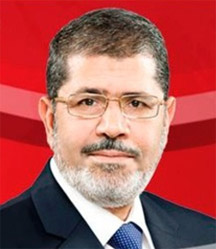CAIRO, (Reuters) – Egypt’s president yesterday promised to put Cairo back at the heart of Arab affairs and made an impassioned appeal to Arab states to work to end the bloodshed in Syria, saying the time had come to change the Syrian government.

Mohamed Mursi, making his first presidential address to the Arab League in Cairo, told Arab foreign ministers that Egypt and its people would “return to occupy their natural place at the heart of the Arab nation”.
Mursi, elected in June after last year’s popular uprising forced Hosni Mubarak from power after three decades, said the time had come in Syria for “change and not wasting time speaking of reform. This time has passed now. Now it is time for change”.
“The Syrian regime must take into account the lessons of recent and ancient history,” he said in the speech in which he also talked of the revolt in Egypt.
Mursi also said a quartet of states – Saudi Arabia, Iran, Turkey and Egypt – would meet to discuss the Syrian crisis.
“The quartet which Egypt has called for will meet now,” he said, without giving details.
An Egyptian delegate said the president’s comments meant the four states were talking about what action could be taken but the formal formation of the quartet was still under discussion. He said no date had been set for its representatives to meet.
Tehran has backed Syria’s government but the three other states want President Bashar al-Assad to stand down.
Analysts said the group was unlikely to agree on how to handle the crisis but said the initiative was a sign of how determined the newly elected president was to put Egypt back at the centre of regional politics.
As Mursi was leaving the podium, the Islamist president briefly returned to the microphone to say: “Syria, Syria, this is the arena to do something”, pointing to the ministers below him, and then again saying “Syria” before stepping away.
It was the second such appeal for action in a week by Mursi. At the Non-Aligned Movement Summit in Iran on Aug. 30, Mursi referred to Tehran’s ally as an “oppressive regime” and said it was an “ethical duty” to back rebels.
More than 20,000 people have been killed in Syria since initially peaceful protests against Assad erupted in March 2011. Tens of thousands more have fled across its borders to neighbouring states to escape the violence.
Nasser al-Kidwa, deputy to Lakhdar Brahimi, the United Nations-Arab League mediator on Syria, arrived in Cairo on Wednesday to join the talks with Arab ministers.
Brahimi, who is expected to visit Cairo on Sunday, has described his bid to broker peace as “nearly impossible” but Kidwa told reporters at Cairo airport that “we have not lost hope” despite the difficulties facing the mission.








